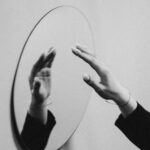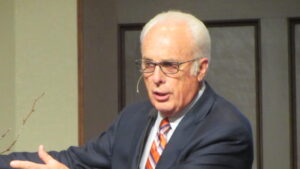When we are in a quiet room alone, we struggle. Our past haunts our present with the noise of our previous mistakes. The future too, with all of its unknowns, brings anxiety.
Blaise Pascal, writing almost four hundred years ago, observed this in Pensées (Thoughts). He said even when the present is delightful, we hate to see it pass away and so we make every effort to prolong it, making light of it, instead of enjoying it for what it is.
Digital distractions all begin with intentional choice.
How difficult it is to be fully present. Pascal surmised, “we never live, but we hope to live; and, as we are always preparing to be happy, it is inevitable we should never be so.”
We Choose To Live Distracted Lives
I fondly remember sitting on the couch as a child, dipping chips in queso cheese, and watching Survivor with my family every Sunday night. I once asked my mom why she enjoyed the show so much. Her response illustrated the rationale behind so much distraction; “it takes my mind off work.”
Distraction like this is intentional. We direct our attention away from one thing and toward another. And like any behaviour, it begins as a conscious choice until it moves into an unconscious habit. While you might have subscribed to one media platform or cable provider for “just one show,” it quickly turns into more.
Digital distractions all begin with intentional choice. Once you start checking your phone a few times an hour, intentionally, for the sake of some good thing, you begin to check it unintentionally, regardless of its value.
At this point, it’d be natural to explain to you some Christianized life-hacks to deal with this difficulty. Set screen limits. Keep your phone away from your bed. Switch to a dumb phone. Bible before social media every morning. Turn off notifications. Talk to others and hold yourself accountable. Study Digital Liturgies. Install blocking software. Pray.
This is good advice. But in the rest of this article, I want you to expose the good in distractions.
Is Distraction Sinful?
There are three kinds of intentional distraction:
- Willful good distractions, such as distracting your mind from haunting memories by praying through Psalm 32.
- Willful “less good” distractions, such as distracting yourself from stress by sharing a funny basketball clip with a friend.
- Sinful distractions, such as distracting yourself from worry by Tweeting a crude joke.
Most people agree with the first and third categories but have difficulty with the gray in between. For a defense of the “less good” category, Alan Noble writes:
“Creation and cultural works help me to cope with the burden of contemporary life, just like everyone else. Ideally, I wouldn’t need help with this burden. But I don’t live in an ideal world, and neither do you. What I know is that when I am exhausted from working and my kids are getting into fights and the AC unit breaks in the middle of summer, it is a good thing to ease my anxiety by making a pun on Twitter.”
Alan Noble clarifies that puns aren’t better than prayer, they are just, “less good.” Many caveats and cautions can be added. But just as not every bite of chocolate is a mark of gluttony, so too, not every digital distraction is sin.
Likewise, Pascal said, “So we are wrong in blaming them. Their error does not lie in seeking excitement, if they seek it only as a diversion; the evil is that they seek it as if the possession of the objects of their quest would make them really happy.”
In some cases, building a home is good (Jer. 29:5). But in others, it’s a sinful distraction. This was the error in Haggai’s day, when God told them through the prophet to “give careful thought to your ways,”(1:5-7). Such consideration of one’s own activity is wisdom (Proverbs 4:26).
I cannot tell you if your distracted tendencies have reached the point of sin. You know better than I. Give careful thought to your ways. Contemplate your actions and the direction of your digital feet.
Do You Know Why You’re Distracted?
People lack self-perspective. They always have.
In the 17th-century, Blaise Pascal said people are “insensible of the insatiable nature of their desire.” And further, “They think they are truly seeking quiet, and they are only seeking excitement.”
We say, naively, if only I had an extra long weekend, or a day at the beach, or an evening under the stars, or a quiet time to nap. But then, once we arrive at our place of leisure, our stillness of body brings chaos of mind.
We distract ourselves, yes, but not because we cannot find rest. We distract ourselves because rest under the sun is never satisfactory. We distract ourselves because we can’t sit still with our thoughts, confronted with the painful truth — we are not as happy as we wish we were, or perhaps, more plainly, we are just not happy.
But do not despair of this despair. It tells us something. As Luigi Giussani put it, “To be aware of the value of such sadness is to be conscious of the greatness of life and to intuit life’s destiny.”
If we were more aware of our nature, of our deep inner desire, then we would discover the meaning behind our unhappiness. We have, as Pascal says, a “secret instinct, a remnant of the greatness of our original nature.” This instinct teaches us that happiness in reality consists only in rest, and not in stir.
There is nothing wrong with enjoying our work and serving God in busy seasons. But every soul awaits a seventh day, a day of everlasting rest.
Distraction’s Purpose
Distraction isn’t new. It’s a condition of the human heart after the fall. We will do whatever we can, weaving fig leaves, crafting metallic animals, swiping in every direction, clicking, typing, anything — as long as we are not left in the quiet alone, naked below the gaze of a holy God.
Distraction reflects our burden-displacement-dependence. Life has its terrors and thorns and we want an escape. We were made to escape, actually. Every aspect of our being will continue to groan until it finds its home in heaven.
Our quest for rest is both elusive and essential. And while Scripture promises “there remains, then, a Sabbath-rest for the people of God,” it also gives the command, “Let us, therefore, make every effort to enter that rest,” (Hebrews 4:6-11).
Digital distractions exist because heaven doesn’t. In eternity, LCD and 4K screens will go black; the only light source will be Christ himself (Revelations 22:5).
Consider your distractions. Consider what’s behind them. And consider Christ, who promised, “Come to me, all you who are weary and burdened, and I will give you rest.”
























